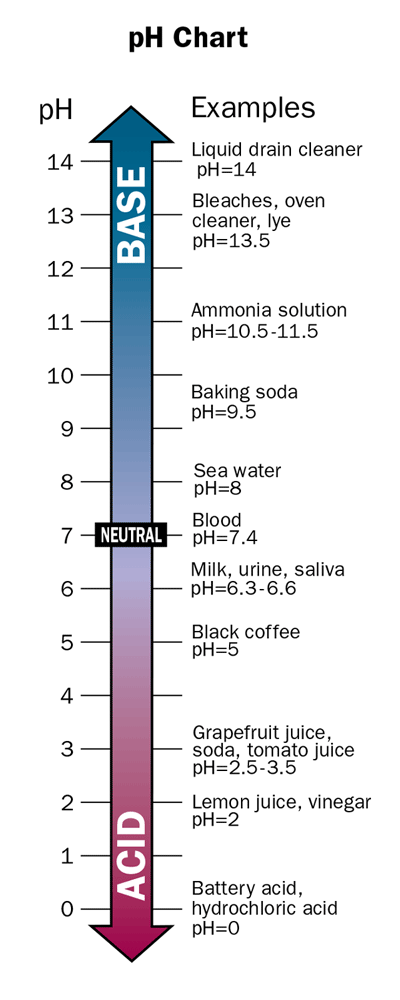The internet is a cornucopia of facts, some true and some “alternative” (in other words, lies). One topic that is particularly plagued by misinformation is pH. People are restricting their diet, buying alkaline water, testing their urine with pH test strips, and buying into bogus cancer cures, all on the basis of false pseudoscientific claims. Going back to basics will help us distinguish pHacts from fiction.
A Quick Primer: pH 101
pH stands for potential of hydrogen. It is a logarithmic scale from 0 to 14 that measures the concentration of hydrogen ions. Water is neutral at pH 7; solutions with a pH less than 7 are acidic; solutions with a pH greater than 7 are basic, or alkaline. Logarithmic means the units represent 10-fold differences: pH 4 indicates 10 times as many hydrogen ions as pH 5. The pH of blood is maintained within a narrow range of 7.34–7.45 by a process known as acid-base homeostasis. Deviations are quickly corrected by compensatory mechanisms in the lungs and kidneys. The pH of stomach acid is 1.5–3.5, human skin 4.7, cerebrospinal fluid 7.5, and pancreas secretions 8.1. None of these are affected by the composition of the diet. The pH of urine can range from 4.6 to 8.0; it changes as the kidneys re-establish homeostasis after an acid or alkaline load. The pH of urine does not reflect the pH in blood or anywhere else in the body.
The Acid/Alkaline: Theory of Disease
This theory claims that too much acidity in the body causes disease, and that eating alkaline foods and drinking alkaline water will improve health. People are encouraged to test the pH of their urine to monitor their acid/alkaline balance. On Quackwatch, Dr. Gabe Mirkin explained that the acid/alkaline theory of disease is nonsense because dietary modification cannot change the acidity of any part of the body except the urine. He says, “If you hear someone say that your body is too acidic and you should use their product to make it more alkaline, you would be wise not to believe anything else the person tells you.”1
An herbalist offered a rebuttal, explaining that while the urine pH is not the same as blood pH, health is affected by small changes in blood pH within the normal range, and the urine pH is a good indicator of how hard your body is having to work to maintain homeostasis and how much stress that is putting on the body’s reserves.2 He claims that being on the low side of the normal blood pH range is unhealthy. There isn’t a shred of evidence to support those claims.
The Alkaline Diet
The alkaline diet leaps wildly to false conclusions from a simple fact: certain foods produce acid ash. In order to buffer the additional acid load, they say the body pulls out alkaline-rich minerals like calcium, phosphorus, and magnesium from the bones, teeth and organs. They say this leads to osteoporosis and fatigue, and compromises our immune system, making us vulnerable to viruses and disease. Avoiding acid foods will make the urine more alkaline, and people with alkaline urine are said to have a reduced risk of osteoporosis, cancer, and heart disease. The alkaline diet is said to facilitate weight loss and increase energy. It is even used to treat cancer. Proponents offer testimonials and cite cherry-picked studies that seem to support their beliefs. However, systematic analyses of all the published scientific studies have determined that the evidence does not support the acid/alkaline theory of disease, so it should be dismissed as pseudoscience. […]

No comments:
Post a Comment